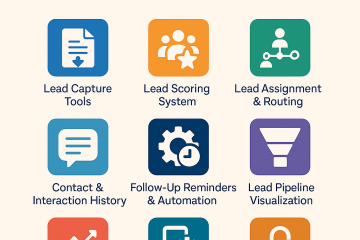Introduction
In today’s competitive business landscape, companies constantly seek ways to improve efficiency, enhance sales, and foster customer relationships. A significant part of this journey involves managing leads effectively. This is where lead management software plays a critical role. Businesses can use it to track, organize, and nurture leads, ultimately converting potential customers into loyal clients. For IT firms and businesses in Delhi, working with a software company in Delhi that offers robust lead management solutions can be the key to unlocking sustainable growth. In this blog, we will explore how lead management software helps businesses grow and what features make it essential for modern sales teams.
Why Lead Management Matters for Business Growth
Lead management refers to the entire process of capturing, tracking, and nurturing potential customers, moving them through the sales funnel until they convert. Without a streamlined process, businesses can lose track of their leads, resulting in missed opportunities and wasted marketing efforts. Efficient lead management ensures that companies can keep track of each lead’s journey, assess the quality of the leads, and engage with them at the right time.
Here are some ways effective lead management fosters business growth:
- Streamlining Sales Processes: Lead management software automates and streamlines the sales process, allowing sales teams to focus on closing deals rather than managing administrative tasks.
- Improving Lead Conversion: By organizing leads efficiently and tracking their interactions, sales teams can nurture leads more effectively and increase conversion rates.
- Enhanced Customer Insights: Lead management systems provide valuable insights into customer behavior, preferences, and needs. This helps businesses tailor their strategies and provide personalized solutions.
How Lead Management Software Works
Lead management software automates the process of capturing, nurturing, and converting leads. It helps sales teams track leads from the moment they enter the system until the deal is closed. The software organizes all interactions with potential customers in a central location, allowing businesses to track communication history, assess lead quality, and assign leads to the appropriate team members.
The typical steps involved in lead management include:
- Lead Capture: The software collects information from various channels such as websites, social media, email campaigns, and phone calls. This ensures no lead is lost, regardless of where it originated.
- Lead Tracking: Every interaction with the lead is logged, providing sales teams with a complete history of communications. This includes emails, calls, meetings, and even social media interactions.
- Lead Scoring: The software assigns scores to leads based on their likelihood of converting. This helps prioritize the most promising leads and focus on those most likely to become paying customers.
- Lead Distribution: Once a lead is captured and scored, it’s automatically assigned to the appropriate sales representative based on predefined criteria such as geography, lead source, or industry.
Benefits of Using Lead Management Software
1. Automated Lead Capture and Nurturing
One of the major advantages of lead management software is its ability to automate key aspects of the sales process. It captures leads from multiple sources such as social media, emails, and landing pages, ensuring that no lead is missed. Furthermore, the software can automate follow-up tasks like sending personalized emails or scheduling calls based on lead interactions.
By nurturing leads automatically, businesses can maintain consistent engagement without overwhelming their sales teams. This not only increases the chances of conversion but also reduces the time it takes to respond to potential clients.
2. Improved Lead Prioritization and Scoring
Not all leads are created equal, and lead management software helps businesses prioritize their efforts by scoring leads based on specific criteria. For instance, leads that have shown significant interest by downloading a whitepaper or attending a webinar are more likely to convert than casual website visitors.
With lead scoring, sales teams can focus on high-priority leads, ensuring their time is spent on the most promising prospects. The software assigns scores to leads based on factors such as engagement level, company size, and buying intent. This helps sales teams engage with leads at the optimal time, increasing the likelihood of closing deals.
3. Centralized Data and Tracking
Lead management software provides a centralized platform where all lead-related information is stored. This means that every interaction with a lead is recorded, providing sales teams with complete visibility into the lead’s journey. Whether it’s a phone call, email, or social media message, the software logs everything in one place.
This centralization improves communication between sales team members, ensuring that leads are not lost or mishandled. It also allows businesses to track lead progress and adjust their strategies based on real-time data.
4. Enhanced Collaboration Between Teams
Sales, marketing, and customer service teams often work in silos, which can result in miscommunication and lost opportunities. Lead management software bridges this gap by providing a unified platform where all teams can collaborate seamlessly.
For instance, the marketing team can view the leads that the sales team is working on and adjust their campaigns accordingly. Similarly, customer service can access lead information to provide better support once the lead becomes a customer. This improved collaboration leads to a more streamlined sales process and better overall customer experience.
5. Detailed Analytics and Reporting
Data-driven decision-making is essential for business growth, and lead management software provides comprehensive analytics and reporting features. Businesses can track key metrics such as conversion rates, lead response times, and customer lifetime value.
These reports help businesses identify which strategies are working and which need improvement. For example, if certain marketing campaigns are generating high-quality leads, businesses can allocate more resources to those efforts. Conversely, if leads from a particular source are not converting, businesses can reevaluate their approach.
6. Seamless Integration with CRM and Other Tools
Many lead management software solutions integrate seamlessly with customer relationship management (CRM) systems, email marketing tools, and other business platforms. This integration allows businesses to manage leads more efficiently and maintain a unified view of their sales process.
For instance, integrating lead management software with CRM ensures that lead data flows smoothly between systems, eliminating the need for manual data entry. Additionally, integration with email marketing tools allows businesses to send targeted campaigns based on lead activity.
Choosing the Right Lead Management Software
When selecting lead management software, it’s essential to consider the specific needs of your business. Some factors to keep in mind include:
- Ease of Use: The software should have a user-friendly interface that allows your team to get up and running quickly.
- Scalability: As your business grows, your lead management software should be able to scale with your needs.
- Customization: Look for a solution that allows you to customize workflows, lead scoring criteria, and reports based on your unique sales process.
- Integration: Ensure the software integrates with your existing tools, such as CRM, email marketing platforms, and analytics tools.
Conclusion
Lead management software is an essential tool for any business looking to streamline its sales process, improve lead nurturing, and drive growth. With features like automated lead capture, scoring, and tracking, businesses can maximize the potential of each lead and ensure no opportunity is wasted. For IT companies in Delhi, partnering with a software company in Delhi that offers customized lead management solutions can give you a competitive edge in the market.
Whether you are a small business or an enterprise-level company, the right lead management software can help you convert more leads into customers and accelerate your business growth.



0 Comments